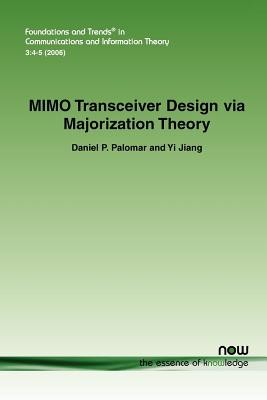
- We will send in 10–14 business days.
- Author: Daniel P Palomar
- Publisher: Now Publishers
- ISBN-10: 1601980302
- ISBN-13: 9781601980304
- Format: 15.6 x 23.4 x 1.3 cm, minkšti viršeliai
- Language: English
- SAVE -10% with code: EXTRA
Reviews
Description
Multiple-input multiple-output (MIMO) channels provide an abstract and unified representation of different physical communication systems, ranging from multi-antenna wireless channels to wireless digital subscriber line (DSL) systems. They have the key property that several data streams can be simultaneously established. MIMO Transceiver Design via Majorization Theory presents an up-to-date unified mathematical framework for the design of point-to-point MIMO transceivers with channel state information (CSI) at both sides of the link according to an arbitrary cost function as a measure of the system performance. In addition, the framework embraces the design of systems with given individual performance on the data streams. MIMO Transceiver Design via Majorization Theory is an invaluable resource for researchers and practitioners involved in the state-of-the-art design of MIMO-based communication systems
EXTRA 10 % discount with code: EXTRA
The promotion ends in 23d.21:20:04
The discount code is valid when purchasing from 10 €. Discounts do not stack.
- Author: Daniel P Palomar
- Publisher: Now Publishers
- ISBN-10: 1601980302
- ISBN-13: 9781601980304
- Format: 15.6 x 23.4 x 1.3 cm, minkšti viršeliai
- Language: English English
Multiple-input multiple-output (MIMO) channels provide an abstract and unified representation of different physical communication systems, ranging from multi-antenna wireless channels to wireless digital subscriber line (DSL) systems. They have the key property that several data streams can be simultaneously established. MIMO Transceiver Design via Majorization Theory presents an up-to-date unified mathematical framework for the design of point-to-point MIMO transceivers with channel state information (CSI) at both sides of the link according to an arbitrary cost function as a measure of the system performance. In addition, the framework embraces the design of systems with given individual performance on the data streams. MIMO Transceiver Design via Majorization Theory is an invaluable resource for researchers and practitioners involved in the state-of-the-art design of MIMO-based communication systems


Reviews